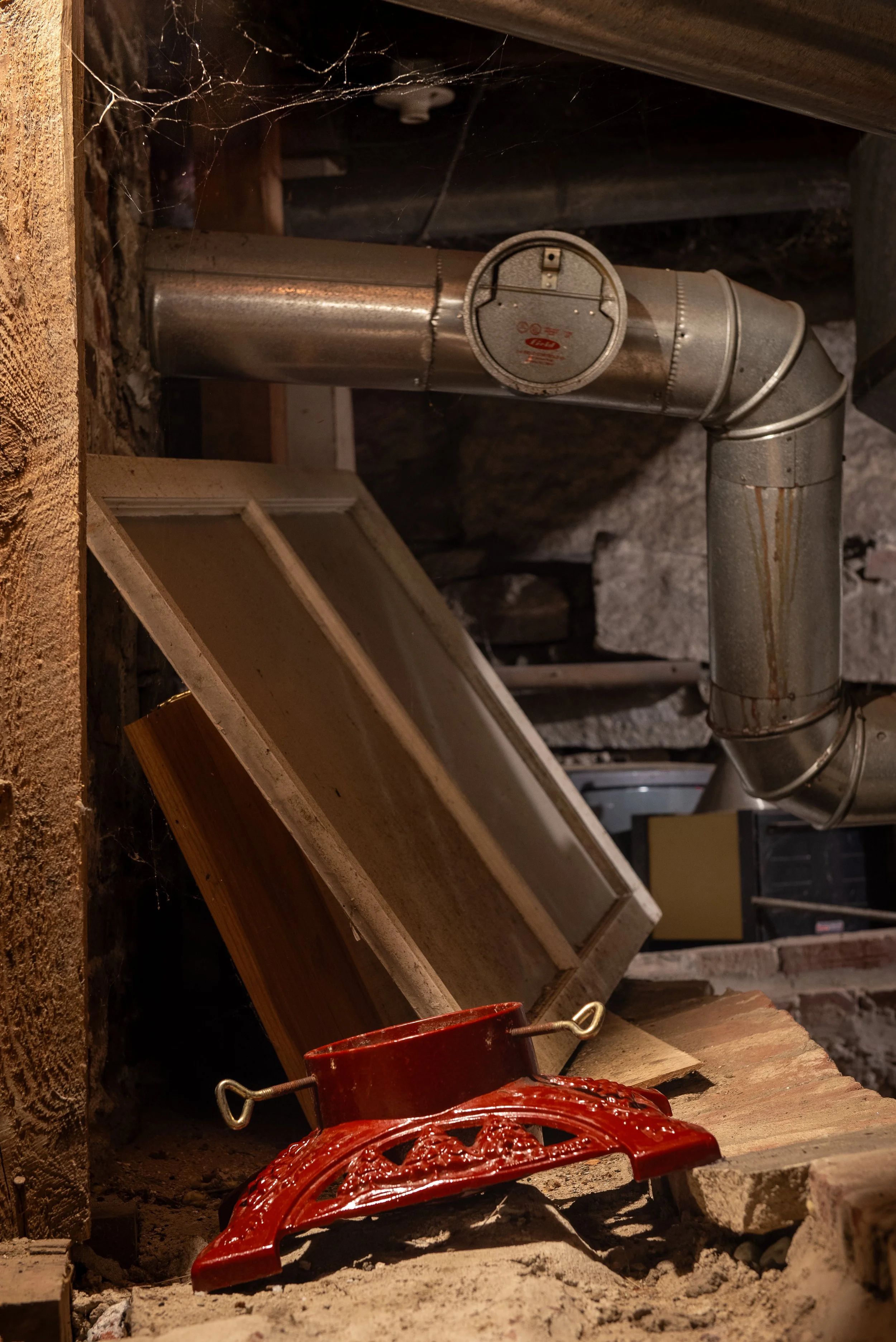It was my father who first put him down cellar. He’d be down there nearly the whole year before my father would let him out again. Two weeks, three tops, he’d be upstairs before he goes down cellar again for the rest of the year.
It’s an old house with an old cellar. Field stone walls with chinks that allow sand in once and a while when the ground shifts for some reason. Nothing for company but the old storm windows put down there in my childhood when someone thought they’d be worth saving. Maybe make a cold frame, or build a shed someday. There are spiders of course and the number of acorn shells suggests chipmunks or squirrels visit. But, for the most part, he just sits by the furnace, waiting.
Now it’s me that goes down and brings him up
And it’s me that takes him back down again just after Epiphany.
On the first day he has the floor to himself. The furniture from his corner of the room has been moved to give him the space he needs to work. Two windows make his corner a little brighter and a little colder. One looks over the porch and down our front walk; the other faces the neighbors’ yard and the bend in the road that curves toward Maine Street. He’ll be hidden beneath the sills but his corner allows him to show his work to passersby.
On the first day he just sits in his enameled glory back in the center of it all. His four feet make a perfect square holding his ample bowl in their midst. The bowl is pierced by a a trio of three-eighth inch screws with great wide flat ends, the size of a quarter or better. It takes some work to loosens his screws, maybe some 3-in-1 oil. The red and white can, who knows how old, murmurs its singular tok-tok when squeezed. I see Dorothy and the Tin Woodsmen. It has been nearly a year since the last turn of these screws. Rust from water in the bowl and hardened pitch from last year’s tree have done their work. But they’ll come loose. Then we will leave him alone in the corner to wait.
There was another before him. Brighter red with a shallower, flimsy, narrow bowl. His spindly detachable legs had a stubborn dogged attitude toward leveling. The agitated oaths that accompanied the annual ritual had an unholy spirit. Finally he couldn’t keep up with the demands for more ostentatious trees, The accretion of rust finally did him in. Perhaps forty years ago my father, nettled one last time by the old tree stand, left the tree in the side yard for another day and stormed off to the next town to the shop, open all night, that had always meant Christmas and winter to plunk down whatever cash was necessary to ease his pain.
In any event, the lore was always that the tree would look better if she had a day or two to graciously spread her branches before receiving lights and garlands. But that’s lore. I think my father just needed a day of rest after contending with the tree before grappling with entangled strands of lights and blackened fuses.
Either way, we respect the tradition and leave them together for a day. She all green and fragrant, he placidly bearing the load in his red armor.
Gradually he disappears again behind the lights, ornaments, each with their own origin story, a colorful decorative floor covering, and eventually, a bulwark of wrapped parcels. He gets a brief visit once or twice a day to replenish her water into which, unaccountably, we drop an aspirin occasionally.
And then, once the New Year is in, his work is done and back down cellar he goes. He is last to leave. The ornaments are packed, the light strands wound up and labeled, the tree thrown over the porch rail, and the kids back at college.
For a time he had kin. I had had my own house, my own growing collection of ornaments, and my own children with their own expectations. I too drove to the same shop in another nearby town to get my own steadfast cast iron tree stand. Time passed and I was back in my old house but with two tree stands. For a time I mounted a second tree on the porch roof or in an upstairs window overlooking the street. But more time passed and a sister moved back to the old town and into a house that needed its own tree stand. Now he is alone again most of the year and his brother is alone in another old cellar or attic across town.
In a week or so I will head down cellar, careful to mind my head, and let him out again to revel in his corner.




